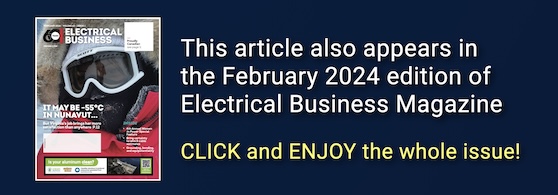
Articles
Features
Women in Power
Articles
News
Profiles
Women in Construction
Women IN power – Shelley Parker, Alectra Utilities
March 22, 2024 | By Anthony Capkun
Summer job takes an unexpected—and lifelong—turn
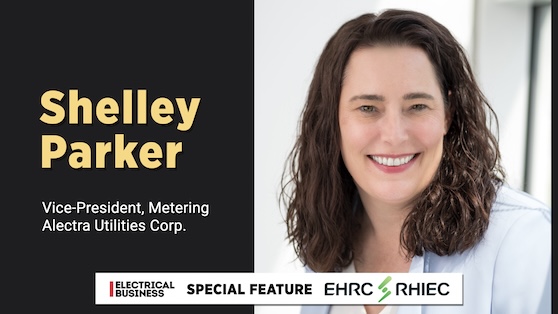 Source: Alectra Utilities Corp.
Source: Alectra Utilities Corp. March 21, 2024 – Before I sit down to profile a female electrical professional, I send them a list of standard “get-to-know-you” questions to get the conversation going.
Questions like: “Describe the moment you decided to get into Electrical, and/or the decisions that led up to it” and “What were some of the barriers you faced that were unique to you as a woman?”.
From their responses and follow-up interviews, I write the profiles you’re about to read. I eagerly await those responses—and to having those conversations—because everyone’s career journey is unique unto itself.
THIS IS SHELLEY PARKER’s STORY
Sometimes the best career path is the one that comes upon you serendipitously, without any great plan or strategy. Such was the case with Shelley Parker, who currently serves as vice-president, Metering, at Alectra Utilities Corp.
“I was 18, in Grade 13… my last year of high school in rural Bruce County,” Shelley remembers. “I had worked on my parent’s farm as a teenager but, this time, I was looking forward to my first real summer job before going on to post-secondary education. I applied at Bruce Power, as they were known to hire students who could lead facility tours or perform odd jobs.”
Things did not go as planned. Shelley never got that summer job at Bruce Power.
“I can only assume that fate had a hand in routing my application, because Ontario Hydro (now Hydro One) contacted me for a job interview,” Shelley remembers. At the time, she thought they were interviewing her for summer student employment, so she didn’t think much of it.
“So imagine my surprise when I arrived at Ontario Hydro—dressed in my best interview outfit—and was asked to get geared up in a line belt and spurs so they could assess my aptitude at climbing a hydro pole and working at heights!” Shelley laughs.
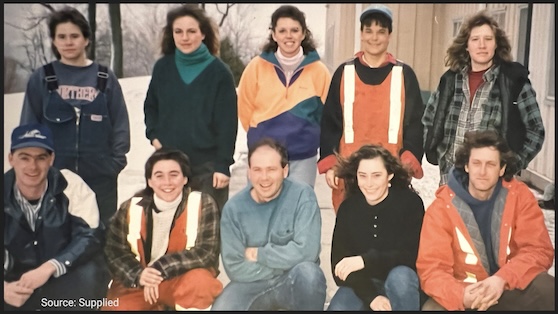
Shelley’s Ontario Hydro team circa 1990.
Prior to this, Shelley had never contemplated a career in the trades, nor did she really know what a Powerline Maintainer does. But she admits to being “absolutely captivated” by what she learned from Ontario Hydro that day, and at a subsequent multi-day lineman interview rodeo.
“There are jobs [in the electrical sector] where you can work outside; where your job keeps you physically active and is actually kind of a sport (I love sports activities!),” Shelley thought at the time. “Jobs in which you are part of a team, where you can see what you’ve built and achieved at the end of each day, and where you provide value to people and communities through power restoration in times of need. I was hooked!”
And so that serendipitous turn several decades ago launched Shelley’s professional career in Electrical. She started as a Powerline Maintainer apprentice in 1990, launching “a fabulous career where I have had the opportunity to work for great organizations and with amazing people”.
Electric utilities provide opportunities to continuously develop your skills and advance your career, Shelley adds. “I’ve had roles in Lines, Control Room, Regulatory, and Customer Service.”
Today, she is the vice-president, Metering, at Alectra Utilities, where she oversees the implementation of the next generation of metering ‘Grid Edge’ technology, “which is crucial for modernizing the grid in the face of electrification, climate change, and net-zero targets.”
Not surprisingly, female Powerline Maintainers were not common in the 1990s. During her five-year stint with BC Hydro, Shelley was the only female Powerline Maintainer in the province.
She recalls facing barriers that “required breaking through stereotypes and preconceptions”, but she credits diversity, equality, and inclusion programs for creating more opportunities for women in the skilled trades.
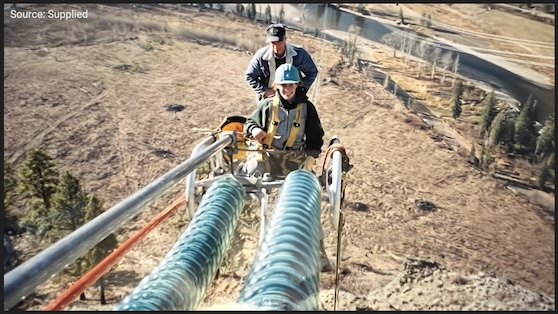
Changing broken insulators on transmission lines, 1995.
“Many companies, including Alectra, are well on the journey of enhancing support for women and other minority groups in our workforces,” notes Shelley, pointing to both informal and formal programs of coaching, mentoring, championing, and sponsoring; DEI programs and training; the promotion of fair hiring processes, and more.
Highlighting her own commitment to equality in the industry, Shelley is a board member of the Ontario Association of Certified Engineering Technicians and Technologists, where she chairs OACETT’s Diversity, Equity, and Inclusion committee.
“We cannot say that we’ve been successful in removing barriers to women and minorities until our workforce is truly representative of our communities; when every employee has a voice, and we have equal pay for equal work.”
The best thing about the Electrical industry, Shelley says, is that its people—electricians, maintainers, technicians, engineers, operators, analysts, and more—are doers.
“Like the grid—with its network of low-voltage, distribution, transmission, and generation assets—all of these people and positions are connected and necessary to ensure the safety, integrity, and reliability of our electrical system.”
Shelley is particularly excited about all the innovation happening right now in the industry.
“Over my 32-year career, I have witnessed the evolution of technology, particularly in the metering department,” she says. “Metering has an exciting and foundational role in energy transformation. We’re thinking through the next generation of technology that is aimed at enhancing the intelligence and resiliency of our grid, reducing the frequency and duration of power outages, and providing new services and analytics to customers to support energy affordability.”
Recently, Shelley was recognized for “Excellence in Trades” at the Greater Niagara Chamber of Commerce’s Women in Business Awards (WIBA). This award is bestowed to a female tradesperson “who is a leader in the field and an inspiration to women in or seeking to enter the skilled trades.”
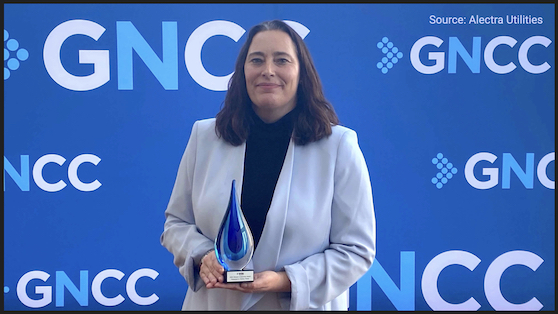
“I have to say… receiving this industry award was such a wonderful moment for me,” Shelley says, gratefully. “It was such an honour to be recognized for my work and its impact in the field of skilled trades.”
For women considering a career in Electrical, Shelley says “Very few people can be successful on their own, so build your network and join support groups.”
“Find those wonderful people in your organization and across our industry to engage as mentors, coaches, sponsors, and champions. Identify your role models. You may be surprised at how many people want to see you succeed!”
And if you cannot find these people in your organization, then leave. “It’s likely not going to be a good fit; worse, it may not be a safe environment.”
She admits that, while it may not be fair, “As a woman, be prepared to work hard. Expect to always have a spotlight on you. Do your best work every day, and make the effort to ensure you have the knowledge, skills, and attitude to succeed”.
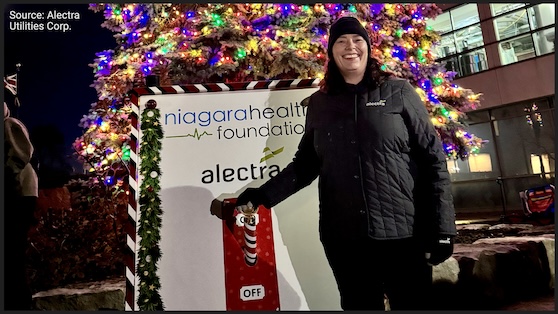
The Niagara Health Foundation’s “Celebration of Lights”. The theme of the 2023 campaign—which was sponsored by Alectra—is “Celebrate recovery, support healing, honour someone special.”
Part of that attitude for success involves being positive. “Positivity is infectious and helps keep challenges in perspective. For women interested in STEM careers, a job in the Electrical sector can lead to a fulfilling, interesting, and fabulous career.”
Shelley’s own career serves as testament to what can be accomplished. That said:
“I’ve never stopped to think about my life in terms of milestones or achievements. I don’t spend much time thinking about accomplishments. I’m happiest when I’m part of a team that is creating an improvement or building a project. There is always another hill to climb.”
This is an excerpt from “Meet these Women in Power” (February 2024 ed.), a SPECIAL FEATURE brought to you by Electrical Business Magazine in partnership with Electricity Human Resources Canada.
Taking on an apprentice may be simple, but it is by no means easy, so hire smarter with work-integrated learning (WIL) opportunities, wage subsidies, and financial incentives for students and apprentices through EHRC.
You’ll find all Back Issues of Electrical Business Magazine in our Digital Archive.
Print this page
